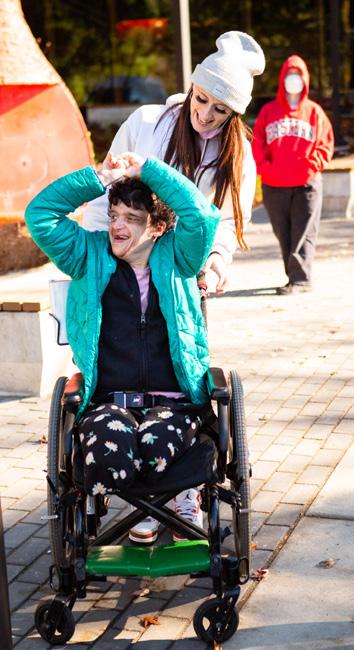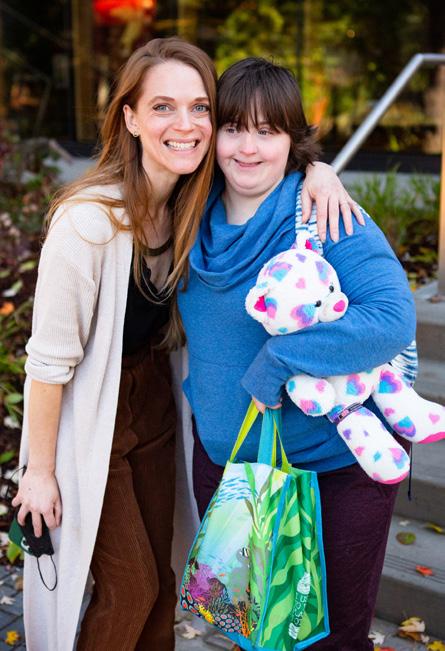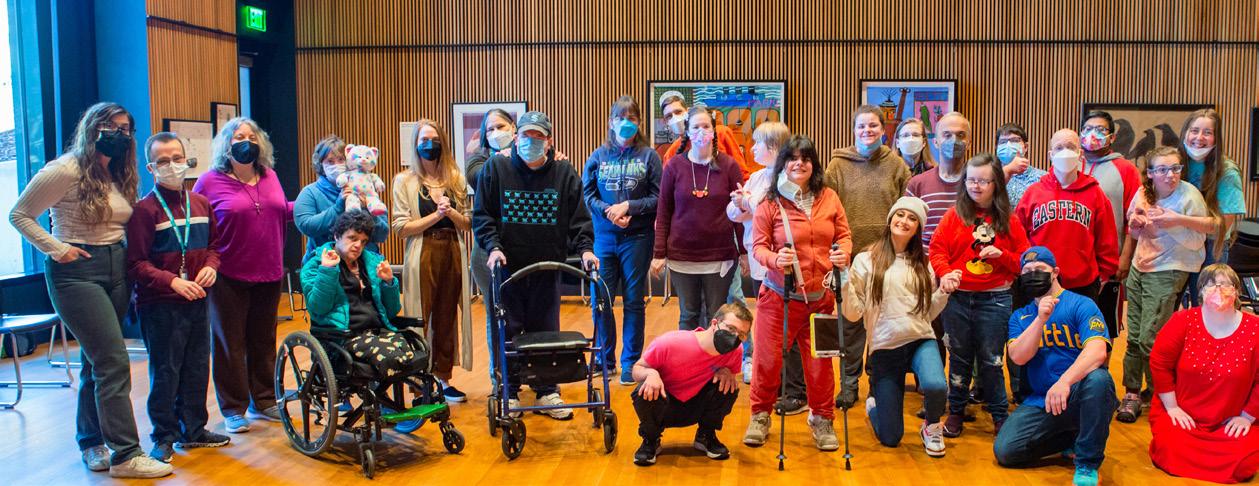
7 minute read
(Re)imagining Inclusivity
(Re)imagining Inclusivity
BY LUCIANO MARANO PHOTOS BY ANNIE GRAEBNER
Inclusivity is a word one hears quite a bit in our current cultural moment. The practice of providing equal access to opportunities and resources for people who might otherwise be excluded or marginalized is being realized across nearly every aspect of society and spurring discussions which, not so long ago, would likely never have happened. Several key artistic institutions on Bainbridge Island are doing their parts, rising to the challenge of meeting the special needs of the neurodiverse community through new partnerships, additions to programming, and even facility improvements.
I. What’s the word?
According to the University of Washington, terms such as “neurodiverse” and “neurodivergent” were introduced in the 1990s by sociologist Judy Singer as an alternative to then-common deficit-based language, such as “disorder.”
Someone who is neurodivergent may be on the autism spectrum, or, more generally, somebody whose brain processes information in a way that is not typical of most individuals. Such people may have learning disabilities, attention deficit and anxiety disorders, obsessive-compulsive disorder or Tourette’s syndrome, among other conditions.
While neurodiversity is most often used to describe a particular group of people, it could really refer to all of us, since everyone processes information in their own individual way.
II. A room of one’s own
Both the programming and Bainbridge Performing Arts’ new facility itself have been designed with inclusivity in mind, said executive director Elizabeth Allum.

“Truly, BPA is a space for everyone,” she said, “from the 3-year-olds to the 93-year-olds.”
And she isn’t speaking metaphorically, either.
Not long ago the BPA education program’s youngest student was, in fact, 3 and the oldest a nonagenarian.
There’s more room in the spotlight than you’d think.
“She’d never taken an acting class before,” Allum said. “Life goals, really and truly—it was inspirational! And that speaks to one aspect, just one aspect, of when we talk about inclusivity and access.”
The recently unveiled Buxton Center for Bainbridge Performing Arts also boasts greater accessibility for wheelchair and walker users in the main theatre, administrative areas and for performers backstage as well. No matter your level of involvement, there’s no barrier.

Additionally, the facility has a special sensory access room, where patrons so inclined can enjoy the show from a slightly removed space that features even more legroom and adjustable lighting and volume controls. As opposed to select performances being offered as sensory-inclusive, wherein lighting and sound settings are adapted and audience conduct expectations are relaxed, Allum contends that having a separate designated space available as needed gives BPA the means to better engage audience members with special needs.
“The production isn’t changed, it’s the same production that everybody is seeing. It’s just that you can experience it in a different way,” she said.
On stage, too, BPA is taking steps to broaden access, partnering with several local organizations that specialize in fostering community engagement for those living with varying levels of neurodivergence, including Neurodiverse Connections and Vitalize Kitsap (formerly Island Time Activities).


Neurodiverse Connections played a crucial part in BPA’s production of “The Curious Incident of the Dog in the Night-Time,” which centers around a neurodiverse individual as the main character. Members of Vitalize Kitsap are now taking things one step further and staging their own performance of the show.

“We’ve fostered a strong partnership with this incredible organization, offering weekly drama classes and helping them to develop a sensory-inclusive performance piece that will be presented in the new studio space in the Buxton Center,” Allum said. “I can’t overstate how wonderful this organization is.”
Kellie Creamer, executive director of Vitalize Kitsap, said the experience of partnering with BPA has been excellent and the benefits for members nearly incalculable. “They’ve just grown so much,” she said. “Learning all kinds of drama skills and voice projection.”
The acquiring of confidence and alternative communication techniques hasn’t been limited to the chattier students, either. Even some of Vitalize Kitsap’s non-verbal participants have, after several rehearsals, become surprisingly comfy in the spotlight, Creamer said.
“You’re sometimes not even sure if they’re listening or they’re understanding,” Creamer said. “But based on all of the practices and the drills that we’ve done in the drama [program] we can see that they are understanding … it’s just been incredible.”
III. All part of the show
“We are lucky to live in such an inclusive community,” said Brian Guy, a Bainbridge resident and activist for greater inclusion in regional performing arts programs. “Anyone and everyone should be able to experience theater.”
In addition to his work arranging sensory-friendly productions in Seattle at both the 5th Avenue Theatre and ACT Theatre, Guy is cofounder of the
island-based nonprofit Neurodiversity
Allies and board member of Bainbridge Island Special Needs Foundation (Stephen’s House) and Ovation! Performing Arts Northwest, and was instrumental in making possible the first sensory-friendly performance of “A Christmas Carol” at ACT Theatre.
“I love bringing like-minded nonprofits together,” Guy said. “We currently have several island-based nonprofits partnering together to benefit our neurodivergent community.”
Specifically, Guy said a performance has been scheduled during which the Ovation! choir, Crescendo!, will sing for the members of Vitalize Kitsap and Stephen’s House. “This brings equal joy to the audience members and to the performers.”
And there’s more joy to come.
“We will have more announcements soon, and the [Neurodiversity Allies] site will keep the community updated about the various inclusive shows. We have at least five coming up in Seattle, all walkable from the ferry, and a few coming up on Bainbridge,” said Guy.
An outspoken proponent for sensory-inclusive performances, Guy explained that such programing, scheduled in advance and advertised as such, supplements a company’s traditional performances and provides an “altered audience environment” where expectations are relaxed. He prefers this approach to the use of a separate sensory-friendly space.
“We want all patrons to experience theater from the main auditorium and not be segregated,” Guy said. “Special sensory spaces are wonderful when supplemental.
Everyone is welcome in the main auditorium at a sensory-inclusive show.”
Plans are in the works to create additional opportunities for the ND community to become even more involved, said Dr. Daniela Ferdico, cofounder of Sensory Access, one of Neurodiversity Allies partners, which facilitates accessibility for those with sensory processing difficulties.
“We are excited to be partnering with Neurodiversity Allies to bring the first sensory-friendly performances to Bainbridge Island with Ovation! Performing Arts Northwest,” she said. “We are also in discussions with inD Theatre to bring Sensory Guides to their shows.” These guides provide a breakdown of the different sensory impacts in a performance, allowing patrons to prepare in advance for all the sights, sounds and emotions they will encounter.
“Inclusion in theater is about allowing all individuals to experience a performance alongside their community,” Ferdico added. “While it is always nice to have a separate space available in case someone needs to step out and reset their sensory system, it is critically important that everyone be able to enjoy the experience together in a non-segregated fashion.”
Sensory Access and Neurodiversity Allies, both headquartered on Bainbridge, are also working on active sensory-friendly projects with Ovation! Performing Arts Northwest and inD Theatre.

It’s like the Bard once said: All the world’s a stage.
The only difference is that now, finally, we’re a lot closer to everyone being able to play their part.

